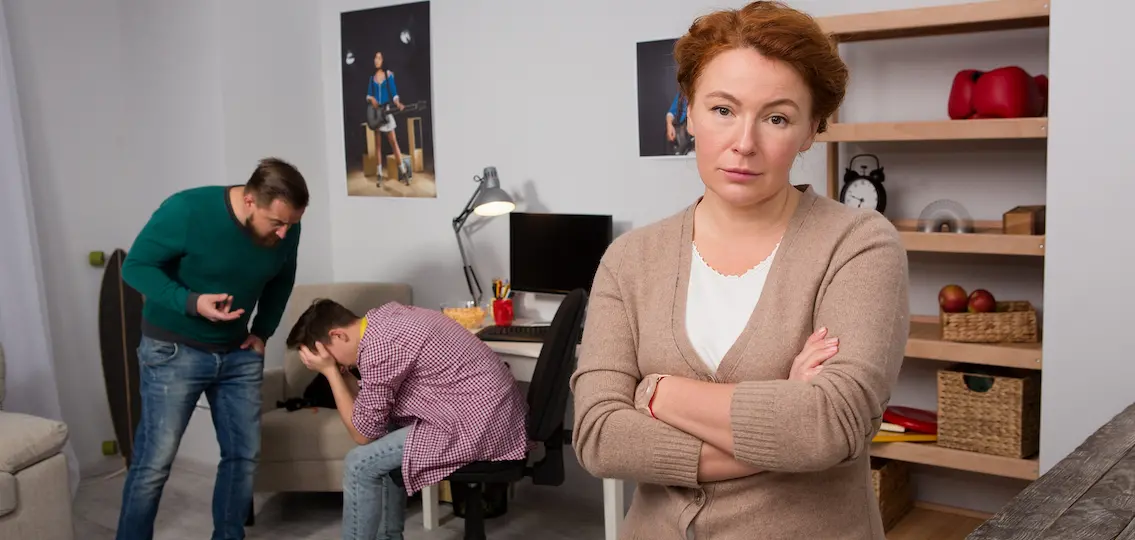We all lose it with our kids sometimes. For many of us, the teen years can be rough. It’s not that teenagers are inherently terrible (really, I promise, they’re not), or that we parents are inherently flawed (again, I promise, we’re not).

It’s because teens are supposed to be separating from their parents in preparation for adulthood. And that’s hard, because they want our help (but not too much help), and we have opinions and suggestions that might actually be helpful (except when they’re not), and all of that whiplash is enough to make any of us lose our minds.
The point here is that conflict with your teen is a normal part of the parent-child relationship, and it doesn’t necessarily mean that you are doing anything wrong or that there is anything wrong with your kid.
Having said that, exploding at our kids when we’re frustrated only makes things worse. It increases our stress, damages our relationship with our children, and doesn’t resolve the problem. But I’m guessing you already know all of that.
You know that because I’m not the first person to suggest that you should stay calm in chaotic moments. The problem is that most of the advice out there starts and stops with some version of, “It’s important to remain patient and calm.”
I think of that as “coulda/woulda advice.” If I coulda done that, I woulda done that. But I couldn’t, so I didn’t. I needed more help, and maybe you do too. If so, try this:
How to Stay Calm with Your Kids in 3 Steps
1. Notice
Noticing is the crucial first step that most of us are missing. If we’re not aware that we’re stretched tighter than a rubber band about to snap, we can’t do anything to calm ourselves down. If we never realize we’re on the verge of exploding, we can’t step back from that ledge.
Fortunately, noticing is a skill we can get better at with practice. Becoming aware of your own red flags is a crucial first step towards keeping your cool. If you answer “yes” to any of the following questions, you might be at high risk of losing it with your teen:
- Are you stressed, exhausted, anxious, confused, or overwhelmed?
- Are you carrying stress in your body? Do you have tense shoulders? Is your jaw tight? Do you have a headache? Is your stomach hurting?
- Are you thinking that your teen is driving you nuts? That you wish you were on a beach, or walking the aisles of Target alone, or anywhere other than here? There’s nothing wrong with thinking those thoughts, as long as we don’t let them dictate our behavior.
Noticing is about shifting our awareness from being caught up in the moment to observing what’s happening. This is a powerful strategy that works at any moment in this process: before we lose it, mid-blowup, and even after we’ve exploded.
2. Pause
The next step is to pause. Just take a second. You don’t have to rush into anything. The point of the pause isn’t to figure out what to do next or decide on a punishment or question every parenting choice you’ve ever made. The point is to calm your system down, to give yourself a chance to breathe.
3. Do anything except yell
From there, just do literally anything else besides yelling. Sometimes the pause will give you enough time and space to get yourself together so you can speak calmly with your teen. But sometimes, it won’t. You might still have tension and stress built up in your body that needs to get out, and you need to respect that. Do what comes naturally for you, and as long as it doesn’t involve exploding at your kids or beating yourself up, it’s a good choice. Here are some options:
- Turn on some music and shake your booty.
- Repeat a mantra or prayer.
- Put your hands flat on the counter and breathe deeply.
- Jump up and down, or run up and down the stairs or the driveway.
- Get silly. Cluck like a chicken. Sing a terrible aria.
Once your nervous system has calmed down, you can decide what to do next. Maybe there’s nothing to be done, nothing to be discussed. It was a moment of tension and you can move on.

Maybe you need to apologize to your child, or maybe there’s a discussion to be had about what led to this moment and what can be done differently next time. Either way, your next steps will be more effective and empathic if they come from a place of calm presence, rather than a knee-jerk reaction.




